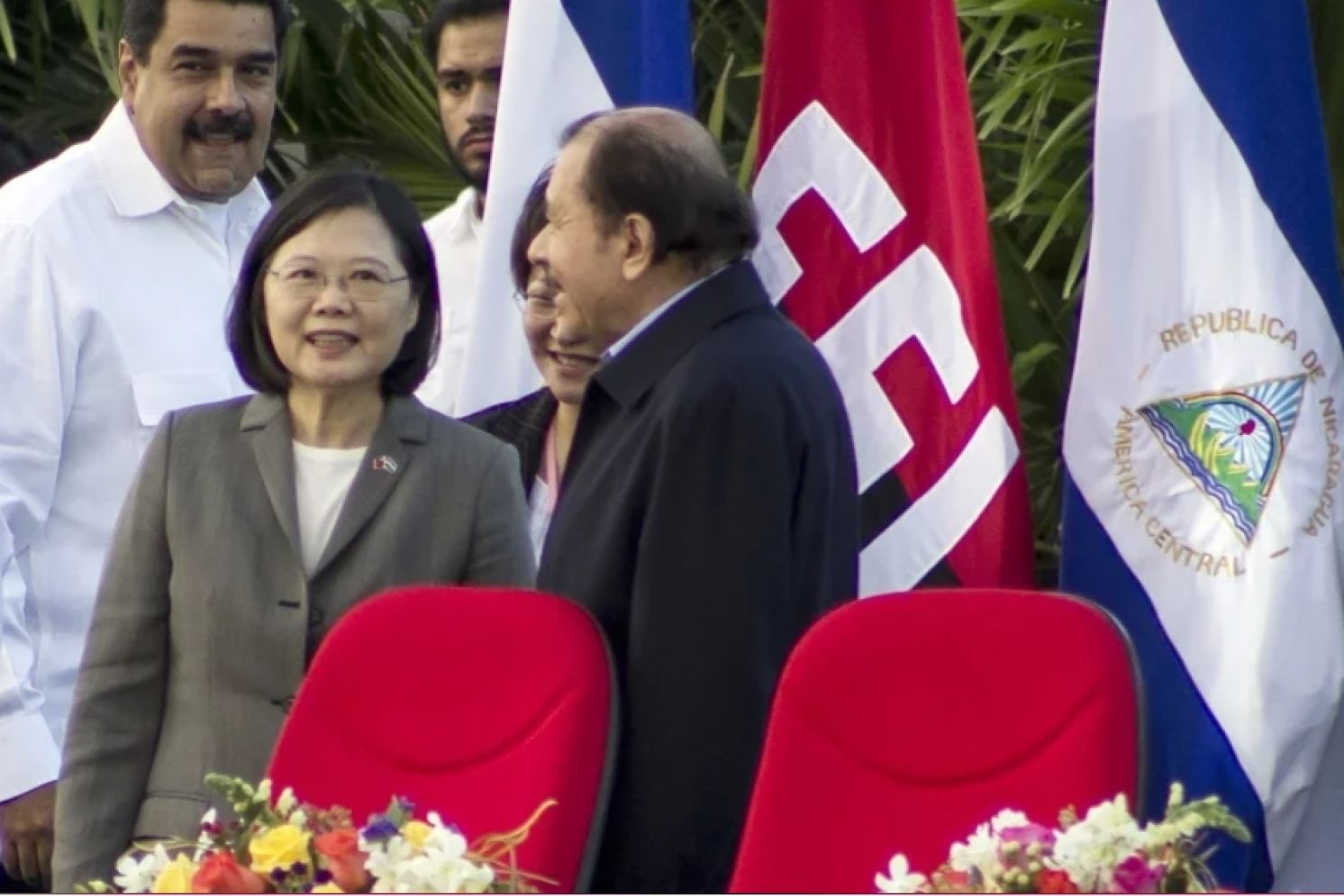
Nicaragua Severs Diplomatic Relations with Taiwan, Implicating U.S.
Summary Report by Taiwan Weekly
Nicaragua announced, without early warning, the severance of formal ties with the Republic of China (Taiwan) on the morning of December 10 and switched diplomatic recognition to the Chinese mainland. The Ministry of Foreign Affairs stated that with deep regrets, the Taiwan government “has decided to terminate diplomatic relations with Nicaragua with immediate effect, end all bilateral cooperation projects and aid programs, and recall staff of its embassy and technical mission in Nicaragua.” The number of diplomatic allies of the R.O.C. has thus fallen to 14 countries, a record low in history.
President Daniel Ortega kept high secrecy before announcing the rupture of diplomatic relations with the R.O.C. Nicaragua made the announcement in the early morning of December 10. The Ministry of Foreign Affairs responded 7 am. In less than two hours, Nicaragua’s delegation to establish diplomatic relations, including two sons of President Ortega, had already appeared in Tianjin, holding high-profile talks with the mainland’s Ministry of Foreign Affairs. The joint communiqué on the establishment of diplomatic ties was signed at 11 am under live coverage by major Chinese official media. The timing was arranged to coincide with the "Summit for Democracy" hosted by President Joe Biden of the United States.
A few days ago, in response to President Biden’s plan to chair a global democracy summit without inviting China and Russia, the mainland’s Ministry of Foreign Affairs and the Taiwan Affairs Office of the State Council stated through their spokespersons that they were firmly opposed to it and would “take retaliatory and counter measures.”
It was assumed that Beijing’s resumption of diplomatic relations with Nicaragua during the Summit for Democracy is ostensibly a blow to Taiwan. While setting fire in the U.S. backyard, it is even more likely to pinpoint the United States.
After Nicaragua unilaterally announced the break-up of diplomatic ties with Taiwan, Financial Times immediately reported that President Ortega pivoted to Beijing in anger because he demanded $100 million for additional financial aid from the Taiwan government but failed. According to the report, President Tsai Ing-wen had promised to provide Nicaragua with a new $100 million loan in the run-up to the election on November 7, but Taiwanese banks refused to lend the funds for fear of contravening American sanctions on Nicaragua. The Ortega government is facing "joint economic sanctions" imposed by the United States, the European Union, the United Kingdom and Canada because of election fraud and autocratic tyranny.
In this regard, the Ministry of Foreign Affairs clarified that the R.O.C. government had never promised any loans before the Nicaragua election last November. Taiwan agreed in February 2019 to extend a commercial reconstruction loan of $100 million at the request of the Nicaraguan government based on humanitarian considerations. The funds would help Nicaragua rebuild its infrastructure in the wake of internal turmoil and social unrest beginning in 2018, affecting the people's livelihood and damaging the economy. But due to funding requirements and procedures, no funds were disbursed so far to Nicaragua by the lending banks. In fact, the loan was not related in any way to the disputed Nicaraguan election in November.
Daniel Ortega was elected president in 1984 and cut off formal ties with the R.O.C. in 1985. He lost the presidential election in 1990, and his successor Mrs. Violeta Barrios de Chamorro resumed diplomatic relations with Taiwan. Mr. Ortega was reelected in 2006, but he did not switch diplomatic recognition to Beijing. Diplomatic ties with Taiwan were maintained until December 9, 2021. During that period, the Ortega government repeatedly let out the message of switching diplomatic ties to mainland China, and in this way it continuously asked Taiwan to increase commercial loans and financial assistance.
The late former Minister of Foreign Affairs Francisco Ou, who once served as the R.O.C. ambassador to Nicaragua, revealed in his memoir that his sole job in Nicaragua was to respond to Nicaragua government’s unreasonable demands. Nicaragua saw through Taiwan’s diplomatic dilemma and repeatedly asked for more aid.
Legislator Chen I-hsin of the opposition Kuomintang (KMT) stated on December 10 that since President Tsai Ing-wen took office, she has lost eight diplomatic allies and withdrawn from two international organizations. Cross-strait relations have deteriorated, leading to a resurgence of diplomatic warfare. No matter how the DPP administration opened more offices abroad and participated in more international forums, such moves are not comparable to the damage caused by losing diplomatic allies and withdrawing from international organizations. He called on President Tsai to apologize to the people, and foreign minister Joseph Wu to step down.
Spokesman Chang Chun-han of the Office of the President noted that Nicaragua broke formal ties with Taiwan and quickly resumed diplomatic relations with mainland China. What should be condemned are the authoritarian forces which have suppressed Taiwan, not the hard-working diplomatic team. Therefore, the president believes that there is no question of resignation for the foreign minister.